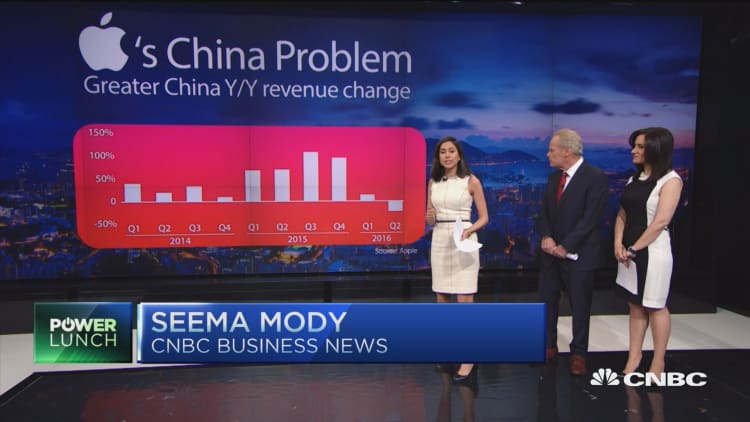Apple may be looking to India as its next key growth market, as CEO Tim Cook told CNBC's Jim Cramer this week, but a growing number of skeptics say the tech giant will likely find it difficult dominating the world's fastest growing smartphone market.
The company has had years of success with its emerging market peer China, but India is a completely different ball game.
First, it is a crowded market with stiff competition. Samsung is currently the top player in India – with 25.3% market share according to research firm IDC. The second leader is Micromax, an Indian consumer electronic company that sells a wide range of smartphones and partnered with key Bollywood celebrities early on to gain traction. Other players include Intex with 10% market share, Lava with 6.8% and Lenovo with 5%. Apple is not even in the top five, holding just 1.9% market share.
Indian experts who to spoke to CNBC said price point is the main factor working against Apple in India.

The Indian smartphone market has many similarities to China six years ago but is more price sensitive, according to analysts at Morgan Stanley.
The average price of an Apple iPhone in India is $612, much higher than Samsung's average selling price of $173 and Micromax's $86, according to Ramon Llamas, research manager at IDC. Llamas also pointing out that last year, 86.5% of all smartphones shipped into India retailed under $200.
"Apple's price point is relatively high for the Indian market when you have viable competitors that are in some cases offering better functionality," said Deven Parekh, managing director at venture capital firm Insight Partners.
One of India's top celebrity bloggers echoed that same sentiment.
"The iPhone still wins easily on prestige appeal, but it's hard to ignore the wide range of premium Android phones available in the market, at a fraction of the cost," said Malini Agarwal a.k.a. MissMalini.
"You can buy 3 full featured laptops for the price of one iPhone 6s Plus. Even a brand new, premium Honda or Vespa scooter is cheaper. That's a tough sell," said Agarwal.
Apple requested to sell refurbished, cheaper phones in India, a request the government there rejected Thursday. (Apple told CNBC the company has yet to see the government's decision.) But even a cheaper iPhone may not be enough to kick-start sales there.
Mobile gurus who spoke to CNBC said consumers in India typically don't pay up for smartphones for many reasons. First, culturally there is this desire to switch or trade phones on a regular basis given the wear and tear associated with the humidity and pollution in India. Second, there is limited availability of LTE and/or 4G in the country, therefore less of a need for a premium smartphone.
However Morgan Stanley's Global Technology Team sees this changing.
"While the high- end smartphone market in India is small – only 6M units at US$300+ or 6% of the total – compelling macro and demographic trends, coupled with increasing 4G and ecommerce adoption, mean users are likely to upgrade to better smartphones over time," wrote Katy Huberty Managing Director at Morgan Stanley on April 20th.
Another question: When Indian consumers upgrade, will they choose the iPhone or another device?
"I do know — from recent observation — that Samsung's new devices are attracting the higher-tier consumers," said Abhijit Das, CEO of Boston East India Hotels, who travels to India regularly.
Apple may be a powerful name in most nations, but in India Samsung and Micromax have stronger brand recognition, said Gene Munster, managing director at Piper Jaffray. "Apple's brand recognition in India is not as strong as it is in the rest of the world," said Munster.
That's why distribution and marketing will be key, experts said. Finding a key strategic partner could be critical to maneuvering through a series of hurdles including launching retail stores and dealing with the Indian government bureaucracy.
Parikh recommends partnering with India's e-commerce players, which has been a great platform for Micromax and other smartphone players.
"E-commerce players like Snapdeal and Flipkart are playing big roles in driving mobile sales in India…so there may be an opportunity for Apple to expand distribution," said Parikh.
Whichever path Apple decides to take, acting fast will be important given the number of international technology companies that are looking to capitalize on India's growing emerging middle class and young digital savvy population.
"India is now the most important country in the smartphone market. We expect India to overtake the U.S. next year as the second-largest smartphone market by units. India will grow nearly five times faster than the world's largest smartphone market, China, where growth has decelerated," wrote Huberty.




